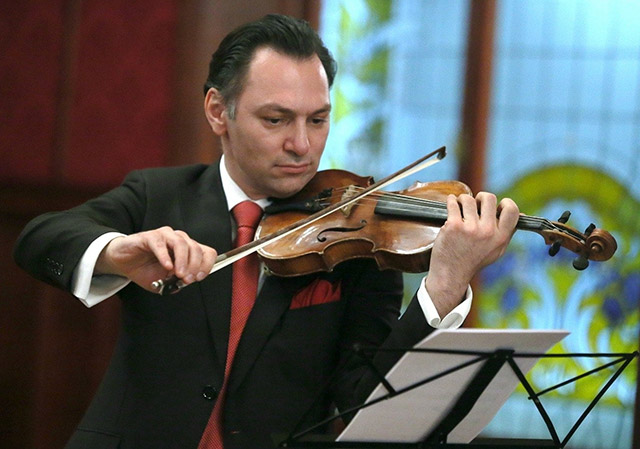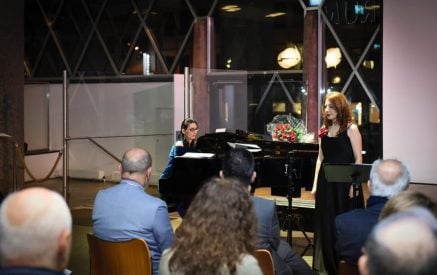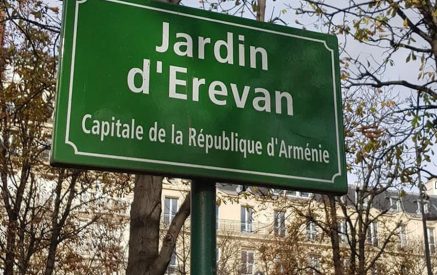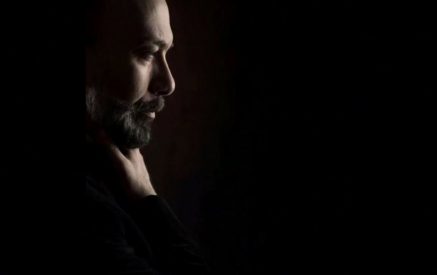Karen Shakhgaldyan is a leading Armenian violinist who has for many years toured the world as part of the renowned Khachaturian Trio, an internationally acclaimed piano trio performing a wide range of music and, in particular, celebrating the works of Armenia’s most famous composer, Aram Khachaturian. He is a laureate of the Pablo Sarasate International Competition and an alumnus of the Moscow State Conservatory and the Graduate School of the Moscow State Conservatory. He has attended masterclasses with such leading figures as Yehudi Menuhin, Vladimir Spivakov, Grigorii Zhislin and Evgeniia Chugaeva, and for several years performed as part of the “Virtuosos of Moscow” Orchestra under the direction of Vladimir Spivakov. He has performed in such prestigious venues as Carnegie Hall (New York), the Bolshoi Theatre (Moscow), Purcell Room (London) and Opera City Hall (Tokyo), and has appeared in concert in over two hundred cities in countries including the USA, China, South Korea, Germany, United Kingdom, Japan, Austria, Australia, Sweden, Spain, Italy, Latvia, Lithuania, the Czech Republic, Georgia, Moldova, Russia and Armenia. We caught up with Karen to learn more about his career and approach to music.
Karen, for over 20 years you’ve been a member of the hugely successful Khachaturian Trio, an ensemble which has received significant praise and performed in over 100 cities around the world. Can you tell us a little about your first meeting?
Yes, it’s quite interesting now to remember how we started. What is really great is that I remember all of our first steps: our first meeting, first rehearsal, first concert… Up until that moment, I had already had experience playing chamber music with great musicians worldwide, and knew how that could be. What was very impressive — and something that I felt from the first rehearsal — was how we seemed to be ‘breathing’ together. The ensemble quality was there from the beginning.
Read also
What is it about Aram Khachaturian’s works that you find most appealing?
It’s not easy to describe Khachaturian’s role in Armenian music, because he made such a giant leap in developing Armenian classical music. Before him there was Komitas, who started to ‘speak’ Armenian musical language to the world, then Khachaturian made it incredibly popular worldwide. I can say that in my experience individually and as part of the trio, quite often people in different countries tell me that they heard about Armenia because of Khachaturian’s music. And, of course, he is very interesting as a composer — especially if we extend our research of him beyond his masterpieces such as the Violin Concerto and the Spartacus and Gayaneh ballets.
You recently celebrated the trio’s 20th year anniversary — what do you think is the secret to the trio’s continued success?
It’s quite simple, the same as when you live together with someone for twenty, thirty, fifty years: you have to be considerate, like you would be with your wife or husband, and you have to listen to each other and enjoy it. It is impossible to be an egoist when you are not alone. Music is a form of harmony and, for me, it’s a perfect example of how to live in general.
In addition to your role in Khachaturian Trio, you are an active soloist. How do you find the experience of switching between these two roles? Is there any crossover?
Yes, it’s a speciality of piano trios. It’s hugely beneficial when all the musicians are soloists and individuals in their own right. Unlike playing in a string quartet — when you have to find a way to ‘manage’ your individuality, allowing it to settle and making sure it blends well in that group of four string instruments — the players in a piano trio are more different from each other than in a string quartet, which gives you more opportunity to play more like a soloist inside the ensemble.
You’ve performed in many of the world’s leading concert halls. Are there any experiences in particular that stand out in your mind, and, if so, why?
Yes, of course, there are key concerts and, especially, halls which remain in our memory for many years. For us such locations were the Musikverein [Vienna], Laeiszhalle [Hamburg], Suntory Hall [Tokyo], Moscow Conservatory, Koerner hall in Toronto… For musicians, when you are on stage, it’s a special moment when you can feel the union of a great acoustic with history and architecture, and when you know that Brahms, Tchaikovsky or Rachmaninov played on the same stage before you.
You’ve worked with numerous organisations and festivals throughout your career — can you tell us a little more about these collaborations?
The history of classical music is a history of collaboration, and of musicians and composers being supported — first by kings and dukes, then by governments, and now by companies and entrepreneurs. For many years we [Khachaturian Trio] have been supported by great personalities who have believed in our project, and decided to help us on our journey. I am speaking of our friend Asadour Guzelian from London, a philanthropist who was a close friend to Aram Khachaturian; the ‘Henderson’ company from Russia and it’s owner Ruben Harutyunyan, who is a great music lover; Artem Konstandyan, banker and financier and a real Armenian patriot, and, of course, the European Foundation for Support of Culture (EUFSC) https://betterauds.com/stories/entrepreneur/konstantin-ishkhanov-president-of-the-european-foundation-for-support-of-culture-eufsc-dedicates-his-career-to-creation-of-opportunity-for-young-musicians/ and its President, Konstantin Ishkhanov, https://www.newsofbahrain.com/trends/75072.html because of whom we have performed at an enormous number of concert series and different festivals. Even during the last two years, which were extremely difficult for musicians because of the various COVID-19 restrictions, we had the opportunity to play concerts thanks to Konstantin Ishkhanov’s activity. This year, we have twenty concerts planned together with the support of the EUFSC, which is absolutely great.
What advice would you give aspiring violinists today?
One of my teachers, the great professor Maya Glezarova once told me: “Don’t play the violin to earn money. Play the violin to discover things about yourself, to research great composers, music and life itself — it’s a great honour and joy to be a good musician. If you will do it perfectly, it could be that you will earn something as well, but it should not be your goal.” I am absolutely in agreement with her. Our profession is a great opportunity to understand the world and to make yourself better. That’s why you have to keep working on yourself, to develop as a person through music, books, movies and great people. Be open and ‘hungry’ for life!




























































